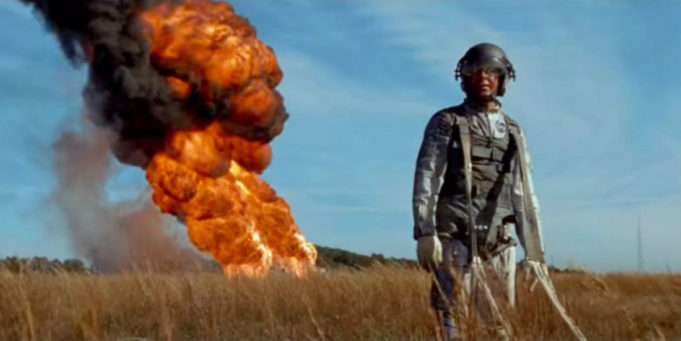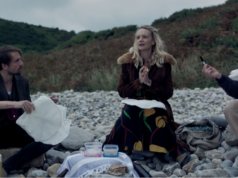I always respect directors who try to prove that they can do more than one thing, so as much as I’d like another musical from Damien Chazelle, I appreciate him following up La La Land with First Man, an account of Neil Armstrong’s journey from the Earth to the Moon. It turns out there’s a great deal more to appreciate about this film than just Chazelle’s versatility, as this historical drama falls shy of greatness but remains terribly impressive.
While Armstrong’s feat has long been a part of American mythology, it’s rather striking how little we got to know the man who did it. In the flush of the Moon landing, Armstrong could have run for public office like John Glenn did, or enjoyed any type of celebrity that the 1970s had to offer. Instead, he chose to live quietly with his wife and sons.
In the rendering of Josh Singer’s script based on James R. Hansen’s book, Neil (Ryan Gosling) is a tormented loner who shuts down emotionally after the death of his 2-year-old daughter due to complications from cancer. He throws himself into his work to numb the pain, rudely brushing off fellow astronaut Ed White (Jason Clarke) when he tries to draw him out on the subject years later. When Neil’s informed that he’s been picked to lead the lunar landing mission, his response is a curt, “Okay.” He does everything possible to avoid his sons before he leaves for the Apollo 11 mission, and when his wife Janet (Claire Foy) forces him to sit down with them, he talks to the boys like he’s fielding questions from reporters at a press conference.
Whereas Hansen’s exhaustively researched book sometimes comes up short on drama, this movie is fortunate to have a filmmaker who can dazzle as well as anyone. Chazelle and cinematographer Linus Sandgren capture the tactile shakiness of early space travel, while the sound team captures every creak of the metal ships as they fly through space. (If you suffer from motion sickness, don’t watch this film on an IMAX screen.) A bravura sequence during a test flight is shot from Neil’s point of view as he has to punch out from a malfunctioning lunar lander prototype and watches the vehicle crash to Earth in a fireball while he parachutes to the ground. Chazelle finds poetry in the little details like condensation freezing on the window of the Apollo 11 rocket, or the astronauts’ view from inside that’s limited by a small triangular window. There’s a great hushed moment when the astronauts reach the Moon and look up to see the lunar surface come into view. The Gemini 8 mission, when Neil and pilot Dave Scott (Christopher Abbott) find themselves hurtling end over end toward the Earth’s atmosphere, is captured in its sickening danger. The disaster that struck the Apollo 1 mission that killed three astronauts is depicted with appropriate brutality, as we see the outside of the hatch suddenly clank with the force of the explosion, followed by a thin wisp of smoke emerging from the crack in the door.
For the first two hours of this 139-minute epic, I was all ready to say how this impeccably crafted movie nevertheless left me cold, never going beyond Neil’s pilot’s cool (and also reducing Janet to yet another thankless suffering wife role). What changed my mind was a tiny and quietly moving moment after Neil sets foot on the surface of the Moon and makes a private gesture with his family in mind. This is a bit of poetic license that does not figure in Hansen’s book, though considering Armstrong’s reserved temperament, it’s just plausible that he could have done something like that on the Moon without telling anyone. After the exuberance and bold colors of La La Land and Whiplash, Chazelle turns out to have the capacity for restraint, too. What can’t he do?
The movie does acknowledge the protests and dissatisfaction in the wider culture towards the Moon voyage, and Fort Worth’s own Leon Bridges turns up in the film, portraying activist poet Gil Scott-Heron and reciting “Whitey on the Moon.” I can’t help but reflect that now we have no manned space exploration program, and socioeconomic inequality is worse than ever, so what have we really gained? As little as First Man seems to share with Chazelle’s previous film, the director is oddly like his romantic protagonists from La La Land, dancing in that planetarium in L.A. He wants to touch the stars, and he’s talented enough to make us feel like we’re touching them.
First Man
Starring Ryan Gosling and Claire Foy. Directed by Damien Chazelle. Written by Josh Singer, based on James R. Hansen’s book. Rated PG-13.












